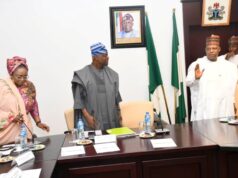LAGOS, AUGUST 24, 2016 – The Nigerian Textile Manufacturers Association (NTMA) has urged the Federal Government to patronise indigenous textile mills for increased production and contribution to the nation’s Gross Domestic Product(GDP).Mr Hamma Kwajaffa, the Director-General of the association, made the appeal in an interview with the News Agency of Nigeria on Wednesday in Lagos.
Kwajaffa said that the textile industry required patronage from government to be revived, and not just funds.
He said the production level of many textile manufacturers had plummeted because of unsold products in their warehouses.
“Government is not patronising our products. We have the capacity to produce all the uniforms needed in the country.
“The financial intervention from government has assisted to boost the quality and quantity of our products but the patronage is not there.
“Most of our production machines are lying idle in the factories while some of them have broken down due to lack of usage,” Kwajaffa said.
He said the capacity utilisation of the sector was not at optimum level, with its present 25 per cent capacity.
Kwajaffa said that patronage from government would enhance production, boost employment and increase its contribution to GDP.
“Before, the textile industry had about 250,000 workers nationwide but now it has been reduced to about 20,000.
“Even the present staff strength is not guaranteed because some of the manufacturers might soon start laying off their staff due to this situation.”
Kwajaffa said that the high rate of smuggled textile materials into the country also constitutes a threat to the growth of the textile industry.
He urged the relevant regulatory agencies to support government’s efforts at reviving the textile industry by curbing the inflow of smuggled materials into the country.
Kwajaffa urged the government to provide the enabling environment through consistent policies to drive the growth of the manufacturing sector.
“Government policies are there but they are not implemented, even when they do, there is no continuity.
“Unless some of our policies are enshrined into law by the National Assembly, any government that comes in will continue to disrupt it,” Kwajaffa said.









